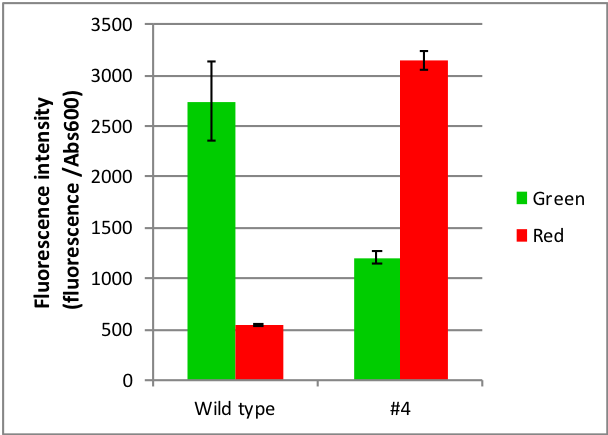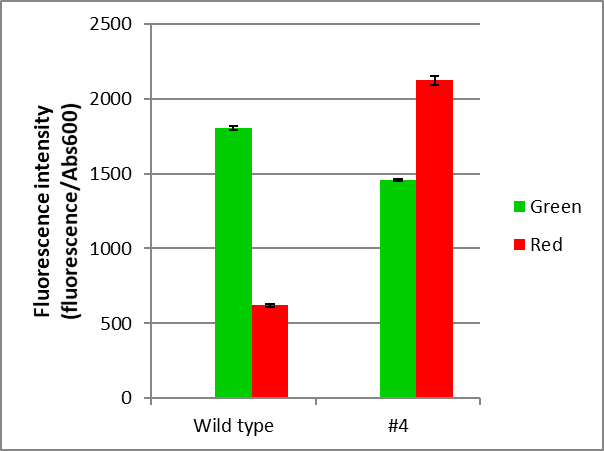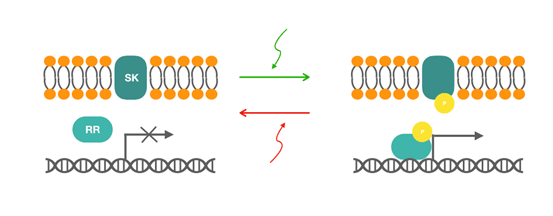Difference between revisions of "Part:BBa K2627000"
(→Characaterization of BBa_K2627000) |
|||
| Line 23: | Line 23: | ||
==Results== | ==Results== | ||
===Characaterization of BBa_K2627000=== | ===Characaterization of BBa_K2627000=== | ||
| − | <p>Part BBa_K2627000 was characterizaed through measuring relative fluorescence intensity, this measurment was taken place in 24-well plates. Cells were cultured in the seed culture medium for 12 hours before inoculated in 24-well plates in three kinds of culture medium. Then fluorescence intensity of CcaS#4 was measured in comparison with BBa_K592001.<br> | + | <p>Part BBa_K2627000 was characterizaed through measuring relative fluorescence intensity, this measurment was taken place in 24-well plates. Cells were cultured in the seed culture medium for 12 hours before inoculated in 24-well plates in three kinds of culture medium. Then fluorescence intensity of CcaS#4 was measured at 9h in comparison with BBa_K592001.<br> |
The following figure shows the relative fluorescence intensity induced by green light and red light.</p> | The following figure shows the relative fluorescence intensity induced by green light and red light.</p> | ||
Latest revision as of 03:58, 18 October 2018
Advanced CcaS with PAS domain knocked out
Usage and Biology
CcaS protein belongs to green/red light sensing two-component system. The two-component system consists of the membrane-associated histidine kinase CcaS and its response regulator CcaR. The activating information stored in light is captured by phytochromes in situ. In phytochromes, a bilin-chromophore (in this case phycocyanobilin) binds at a conserved cysteine within an N-terminal GAF (cyclic GMP phosphodiesterase, adenylyl cyclase, FhlA) domain and imparts reversible photoactivation of signaling activity with maximal responses to 535-nm (green) and 672-nm (red) light. Absorption of green light increases the rate of CcaS autophosphorylation, phosphorylation of CcaR by phosphate transferring, and transcription from the promoter of the phycobilisome linker protein cpcG2, while absorption of red light reverses this process. The lower leakiness is reported to be acquired after removing the second putative promoter in cpcG2, which is thought to be constitutive and contributes to leakiness and low dynamic range.
Part BBa_K2627000 was improved from the original CcaS (BBa_K592001) by deleting about 800 bases corresponding to two PAS domains since we were inspired by Professor Koji’s work. Part BBa_K2627000 (CcaS#4) is a varient of CcaS having an opposite response to green/red light. High intensity of fluorescence can be seen when bacteria are cultured under red light while fluorescence is pretty weak under green light.
Sequence and Features
- 10COMPATIBLE WITH RFC[10]
- 12INCOMPATIBLE WITH RFC[12]Illegal NheI site found at 606
- 21INCOMPATIBLE WITH RFC[21]Illegal XhoI site found at 1397
- 23COMPATIBLE WITH RFC[23]
- 25COMPATIBLE WITH RFC[25]
- 1000COMPATIBLE WITH RFC[1000]
Results
Characaterization of BBa_K2627000
Part BBa_K2627000 was characterizaed through measuring relative fluorescence intensity, this measurment was taken place in 24-well plates. Cells were cultured in the seed culture medium for 12 hours before inoculated in 24-well plates in three kinds of culture medium. Then fluorescence intensity of CcaS#4 was measured at 9h in comparison with BBa_K592001.
The following figure shows the relative fluorescence intensity induced by green light and red light.

Figure 1. Characterization of part BBa_K2627000 and BBa_K592001 in M9 medium whose carbon source is glucose. Part BBa_K2627000 shows a different effect that the index under red light is higher than the index under green light. For this reason, we can treat the index under red light as expression index and treat the index under green light as leak index. The #4 has the reverse function and the dynamic range is about 2.6.

Figure 2. Characterization of part BBa_K2627000 and BBa_K592001 in M9 medium whose carbon source is glycerol. Part BBa_K2627000 shows a different effect that the index under red light is higher than the index under green light. For this reason, we can treat the index under red light as expression index and treat the index under green light as leak index. The #4 has the reverse function and the dynamic range is about 1.5.

Figure 3. Characterization of part BBa_K2627000 and BBa_K592001 in M9 medium whose nitrogen source is yeast extract. Part BBa_K2627000 shows a different effect that the index under red light is higher than the index under green light. For this reason, we can treat the index under red light as expression index and treat the index under green light as leak index. The #4 has the reverse function and the dynamic range is about 1.2.

